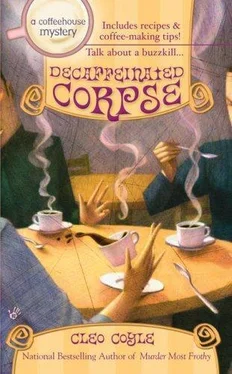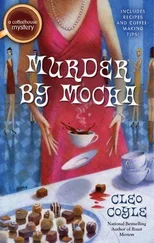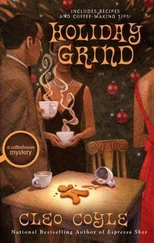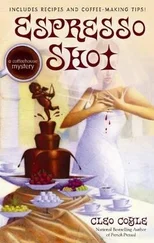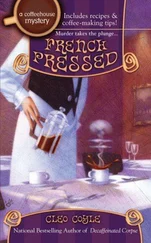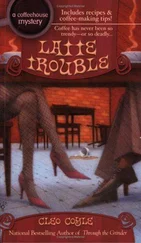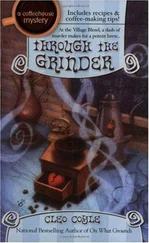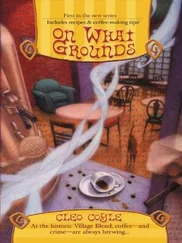Клео Коул - Decaffeinated Corpse
Здесь есть возможность читать онлайн «Клео Коул - Decaffeinated Corpse» весь текст электронной книги совершенно бесплатно (целиком полную версию без сокращений). В некоторых случаях можно слушать аудио, скачать через торрент в формате fb2 и присутствует краткое содержание. Год выпуска: 2007, ISBN: 2007, Издательство: Berkley, Жанр: Детектив, на английском языке. Описание произведения, (предисловие) а так же отзывы посетителей доступны на портале библиотеки ЛибКат.
- Название:Decaffeinated Corpse
- Автор:
- Издательство:Berkley
- Жанр:
- Год:2007
- ISBN:978-1-436-25369-7
- Рейтинг книги:5 / 5. Голосов: 1
-
Избранное:Добавить в избранное
- Отзывы:
-
Ваша оценка:
- 100
- 1
- 2
- 3
- 4
- 5
Decaffeinated Corpse: краткое содержание, описание и аннотация
Предлагаем к чтению аннотацию, описание, краткое содержание или предисловие (зависит от того, что написал сам автор книги «Decaffeinated Corpse»). Если вы не нашли необходимую информацию о книге — напишите в комментариях, мы постараемся отыскать её.
Decaffeinated Corpse — читать онлайн бесплатно полную книгу (весь текст) целиком
Ниже представлен текст книги, разбитый по страницам. Система сохранения места последней прочитанной страницы, позволяет с удобством читать онлайн бесплатно книгу «Decaffeinated Corpse», без необходимости каждый раз заново искать на чём Вы остановились. Поставьте закладку, и сможете в любой момент перейти на страницу, на которой закончили чтение.
Интервал:
Закладка:
“You can call me Clare,” I said, and not for the first time. “What are you doing here? You said you were running a fever last night.”
“I was, but I stayed in bed, slept it off... I’m good to go now, and I thought I’d make up the time by pulling a double shift today. I wouldn’t want to lose this job, you know? Rents are tough around here, even with the three of us in the two bedroom.”
Dante lived on the Lower East Side near Teany (the recording artist Moby’s restaurant) in a two bedroom apartment he shared with two female friends from college. He said each of the girls had their own bedroom and he spent most of his nights on the sofabed in the living room. “Most” of his nights had a sort of Big Love bigamist ring to it, but I never pried.
In the course of his barista chatting, I’d overheard him talk about a pipe dream of purchasing his own Soho loft— a pretty common wish for young painters who come to the big bad city expecting a sun-washed studio. The reality check, of course, was more than obvious with one glance at the Times real estate section. Those legendary spaces were priced for investment banker types, not aspiring artists working part-time at coffeehouses.
“Dante, calling in sick every now and then isn’t going to get you fired,” I assured him. “But I’m glad you’re here. Apron up.”
“Excellent.”
He clapped his hands and came around the counter. Stepping into the pantry area, he removed the backward Red Sox baseball cap from his shaved head and peeled off his long flannel shirt, revealing more than a few tattoos on his ropey arms. I actually liked his pieces of skin art. My favorites were the demitasse on the top of his left wrist and a Picasso-esque Statue of Liberty on his right forearm.
The day I’d met him, I’d asked what was up with the body art, and he admitted, with a great deal of pride, that he’d designed every tattoo he displayed. As a painter, he said he wasn’t about to let anyone else stain the canvas of his own skin.
A new crowd of customers flowed into the store, and I put Dante on the espresso machine. “Take a few practice runs.”
“Don’t need to, Ms. Cosi,” he said, tying on the Village Blend apron.
“Humor me, Dante. Take them.”
To me, espresso-making was an art. Like a perfectionist painter, a superior barista was one who exhibited an expert hand and palate. From day to day, adjustments needed to be made. Even the weather was a factor. High humidity meant the espressos could run slower, and the beans would have to be ground somewhat coarser. Lower humidity meant the espressos could run faster, so a finer grind was required.
I didn’t want one single inferior demitasse served under my watch, which was why I insisted Dante make some test shots. As I supervised, he ran through the process.
Initially, I’d been wary of Dante. When he’d approached me three weeks earlier, asking after employment, the guy’s tattoos made me wonder just how fringe he was. I’d already lost two part-timers in two months, and I didn’t want to spend time training someone who would start bugging out on shifts. But then he began talking, and I could see he was articulate, intelligent, and (this capped it) he’d already been trained. In his teen years, he’d worked at a coffeehouse in Providence, so he was an old hand at making Italian coffee drinks, not to mention handling thirsty urbanites with caffeine deficits.
During his first week, he was a little rusty at applying even pressure at the tamping stage. At least thirty pounds of pressure is needed when tamping down the freshly ground coffee beans into the portafilter—and if the cake of grounds is uneven when steaming water is forced through it, you’re in for some nasty business. Water takes the path of least resistance, so the lower side of an uneven cake would end up over-extracted (too much water passing through), the higher side under-extracted (not enough water), and the result is a vile little schizoid cup I’d be embarrassed to serve to a paying customer.
Today there were no such problems. I sampled both of Dante’s shots. The first was the tiniest bit over-extracted, but the second was perfect—from the viscosity to the roasty, caramelly flavor of the crema (that beautiful, nut brown liquid that separates from the ebony espresso like the head of a freshly tapped Guinness).
We worked in tandem after that. I greeted customers, manned the register, watched the levels on the Breakfast Blend urns. Dante pulled espressos and kept the stainless steel pitchers of milk steamed and frothed. Then we switched positions.
“I’m glad you came by, Dante.”
“No problem.”
“I still need two, even three more part-timers for coverage.I ended up closing last night, and I’m still dragging this morning.”
“Why did you close? Wasn’t Tucker scheduled for that?”
“Yes, but...” I stopped my running mouth. After letting my guard down with Matt, I wasn’t about to start spewing last evening’s details to my newest barista. “A friend of mine dropped by and our chatting ran late, so I just let Tucker go early.”
“A friend? You mean that cop, don’t you?”
“Detective Quinn. Yes.”
Dante nodded. “Well, I guess you’re right then. It’s a good thing I came by...”
When Tucker arrived at seven fifty, the real morning crush began. We were soon swamped, with a line out the door until ten thirty. As the crowd finally thinned, I left the two of them alone with a vague excuse about needing to complete some paperwork. Then I headed upstairs with a basket of freshly baked muffins.
Federico Gostwick hadn’t been up long when I entered the duplex. He’d just showered, and I called upstairs, inviting him down for breakfast. His clothes were still at his hotel, so he threw on Matt’s long terrycloth bathrobe and slippers. Then he shuffled into the kitchen, dropped down at the table, and sampled a warm cappuccino muffin— made for the Blend by a local bakery from one of my old “In the Kitchen with Clare” column recipes.
“Mmmm...” Ric murmured as he chewed and swallowed. “What nut am I tasting here? Wait. I can tell you...” He took another bite, closed his eyes. “Hazelnut?”
“That’s right.”
“Quite delightful, Clare... very rich texture.”
“Sour cream. That’s the secret.”
As I brewed Ric’s un-coffee, I continued with the general chit-chat, asking after his injury (it ached, but he would live), his night’s sleep (very restful, thank you), and his trip here from Brazil (the JFK customs processing was detestable). Then I poured him a cup of his “why bother?” and started bothering—with the real questions.
“Did Matt happen to mention that I’ve had some pretty good luck investigating”— how do I put it? I thought— “suspicious things?”
Ric smiled, rather indulgently it seemed to me as I took a seat across from him at the small kitchen table.
“He told me I could trust you,” Ric said.
“You can. I want to see you safe, you know?”
“Me, too, love, believe me.”
“Then tell me why all the secrecy? Why won’t you go to the police about last night? What is it you aren’t telling me?”
Ric sipped his decaf, stared into the dark liquid. “This breakthrough of mine... it’s very new.”
“I know.” Hence the term “breakthrough.”
“There are a lot of people who may want my new coffee plant to grow for themselves.”
“That goes without saying, but they can’t get it, right?”
“Yes, the farm and nursery are in a remote location, but more important, my family and I have kept the research very private.”
“Then last night, someone assaulted you. Think, Ric... do you have any enemies? Anyone who might want to see you hurt... or even killed?”
Читать дальшеИнтервал:
Закладка:
Похожие книги на «Decaffeinated Corpse»
Представляем Вашему вниманию похожие книги на «Decaffeinated Corpse» списком для выбора. Мы отобрали схожую по названию и смыслу литературу в надежде предоставить читателям больше вариантов отыскать новые, интересные, ещё непрочитанные произведения.
Обсуждение, отзывы о книге «Decaffeinated Corpse» и просто собственные мнения читателей. Оставьте ваши комментарии, напишите, что Вы думаете о произведении, его смысле или главных героях. Укажите что конкретно понравилось, а что нет, и почему Вы так считаете.
